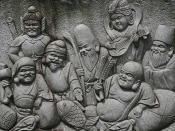Since the time of the biblical Abraham, the dominant religions of the Middle East have changed from polytheistic to monotheistic. The monotheistic religions Judaism, Christianity, and Islam all trace their roots to Abraham and generally agree upon the fact that they worship his God, with their own belief structures developed around it. With their similar backgrounds, the followers of these monotheistic faiths have come to view God with some attributes that are common throughout them all to some degree or another.
One of the most readily apparent examples of this is the idea that God is anthropomorphic in these monotheistic religions. While this is certainly not a new concept in the arena of religion, its application has been fairly unique in regards to monotheistic faiths. In Judaism, the most ancient of these religions, the books of the Old Testament are a set of compositions describing God's actions in our world, both directly and indirectly.
The Jewish name for their God is Yahweh. Jews believe that Yahweh has chosen them as "His people" and believe that they share a sacred covenant with him. By following the rules that have been passed down to them by God, they believe that they acquire a divine protection that is unique to them. In this we see that the Jewish concept of God is able to rationalize, favor, and protect man. Through the laws, the Torah, given to the Jews by God, we see that their God also has a sense of justice, which implies the ability to enforce the laws being handed down. In Judaism, the concept of an anthropomorphic God has led to several beliefs. The belief that Jews are the Chosen People has led to the development of an inferiority complex on the part of the Jews when looking at pagan faiths.



Good comparisons
i like how this essay gives an equal portrayel of all three religeons, and helps to show everyone that they all originate from the same source.
5 out of 5 people found this comment useful.